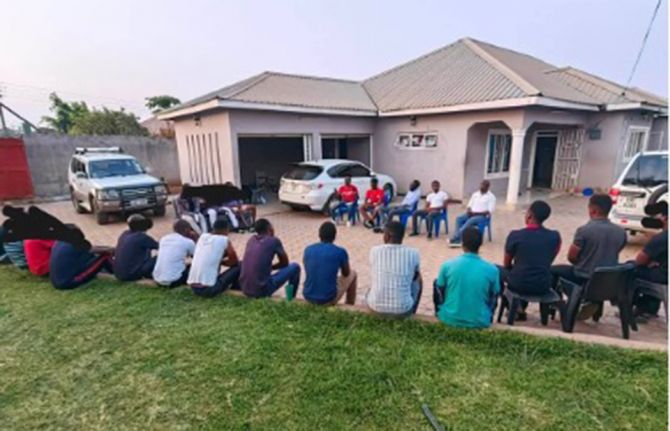
Feature Story
‘Young People We Care' volunteers assist vulnerable households in Zimbabwe
24 August 2011
24 August 2011 24 August 2011A version of this story was first published at UNICEF.org

Young People We Care volunteers harvest for Ambuya Sylvia Nyawera.
Credit: Bertha Shoko/Nyanga, Zimbabwe
Ambuya Sylvia Nyawera is an elderly woman from the village of Dombo in the rural Nyanga area of Zimbabwe, about 300 kilometres east of Harare. Her life can be lonely. After spending the weekend with her son John, a schoolteacher in another part of Nyanga, Ms. Nyawera is by herself again.
She lost her other children to AIDS-related illnesses a few years ago. “If they were here, they would take care of me,” she explains. “John does his best, but he can’t be here all the time because he has to work and also take care of his family.”
Although HIV prevalence in Zimbabwe is declining, at more than 14 percent in the adult population it is still high. Many older people have been affected by HIV, with the death of their children leaving them to fend for themselves. Some are also now caregivers to the almost one million orphans left behind by AIDS in the country.
Although Ms. Nyawera feels a deep sense of longing for her late children, she has been blessed with more ‘children’ who visit her at least three times a week through the Young People We Care (YPWC) programme. She looks forward to their company.
Easing the burden
Without these children I really would not have harvested much. They worked hard. God will bless them
Ambuya Sylvia Nyawera, Nyanga, Zimbabwe
An initiative of UNICEF Zimbabwe, the YPWC programme began in 2005. It is part of an effort to offer support to households where there is illness or where an elderly person has no one to take care of them.
YPWC also gives young people information on how to prevent HIV, how to access care and treatment to young people in need, and provides skills training in preparation for adulthood. Several thousand participants have now gone through the programme.
This past farming season, YPWC members helped Ms. Nyawera plant and harvest about 20 bags of maize, her biggest crop in five years. They also assisted her with planting and harvesting potatoes, thereby significantly improving food security in her household.
“Without these children I really would not have harvested much. They worked hard. God will bless them,” says Ms. Nyawera.
An enriching experience
Before I became a member of the YPWC programme, I had very little knowledge about AIDS. Now I understand that I can live a normal and productive life even though I am HIV-positive.
Hilda, member of the YPWC club in Nyanga, Zimbabwe
Being part of a YPWC club also often benefits the young volunteers. The Nyanga club is composed of 10 young people who are out of school.
One of them, Hilda, 18, has been living with HIV since birth and recently started antiretroviral treatment. As a result of illness, Hilda sometimes cannot join her team for home visits, but she never misses a chance when she is well.
Hilda says being a volunteer has allowed her to come to terms with her own HIV status.
“Before I became a member of the YPWC programme, I had very little knowledge about AIDS,” she recalls. “Now I understand that I can live a normal and productive life even though I am HIV-positive.”
Part of the solution
With support from UNICEF and many others, YPWC continues to make a difference in towns and villages across the country.
“The role that the YPWC clubs is playing in communities cannot be over emphasized,” says UNICEF Representative in Zimbabwe, Dr. Peter Salama. “As a result of HIV, the burden of care remains very high in many communities,” he adds. “Young people represent a critical element of the solution, and we need to continue to honour their skills and energy.”



